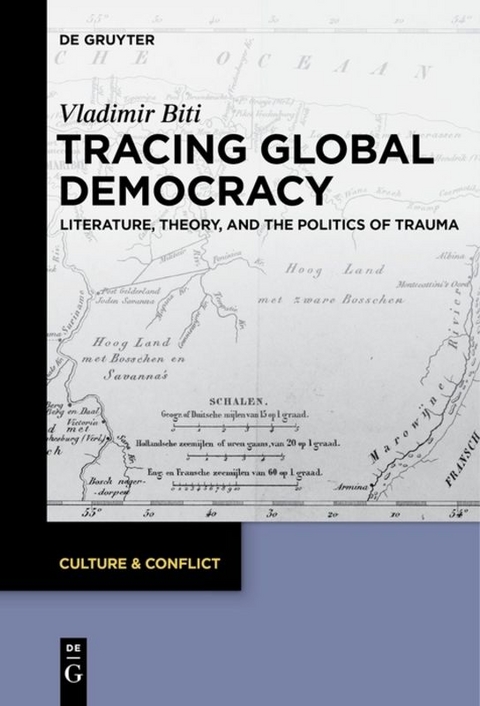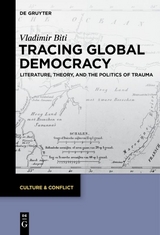Tracing Global Democracy
Literature, Theory, and the Politics of Trauma
Seiten
The series Culture and Conflict aims to promote a dynamic, pluridisciplinary dialogue meant to discuss the multiple ways in which conflict influences, supports or constrains the production of meaning in modernity. It publishes innovative original scholarship from the fields of literary and cultural studies as well as media, visual and film studies. Culture and conflict inevitably go together. The very idea of culture is marked by the notion of difference and creative, i.e., conflictual interaction. Differential markers, such as self and other, inside and outside, high and low, pure and dirty, old and new, support the key themes of the study of culture, e.g., identity and diversity, memory and trauma, translation of cultures and globalization, mediation and exclusion. The new series Culture and Conflict aims to promote a dynamic, pluridisciplinary dialogue meant to discuss the multiple ways in which conflict influences, supports or constrains the production of meaning in modernity. It publishes innovative original scholarship from the fields of literary and cultural studies as well as media, visual and film studies.
Focused on the recently hotly debated topic at the crossroads of various human and social sciences, this book investigates the emergence of the cosmopolitan idea of literature and its impact on the reconfiguration of the European and non-European political spaces. The birthplace of this idea is its designers’ traumatic experience as induced by the disconcerting condition of their abode.The thesis is that the eighteenth and nineteenth century’s cosmopolitan projects that grow out of such deep frustrations trace the twentieth century’s global democracy. This hidden origin of cosmopolitan projects dismantles the usual European representation of modernization as universal progress as myopic. Rather than being a generous action of prominent subjects such as Voltaire, Kant, and Goethe, or Bakhtin, Derrida and Deleuze, cosmopolitanism is an enforced reaction of the instances dispossessed by injury that search for the ways of healing it. Yet as soon as their remedy establishes itself as the ground for universal reconciliation, it risks suppressing other’s trauma, i.e. turns from politics into a police. Articulating the author’s position in the recent debates on the structure of democracy, the epilogue suggests an alternative strategy.
Focused on the recently hotly debated topic at the crossroads of various human and social sciences, this book investigates the emergence of the cosmopolitan idea of literature and its impact on the reconfiguration of the European and non-European political spaces. The birthplace of this idea is its designers’ traumatic experience as induced by the disconcerting condition of their abode.The thesis is that the eighteenth and nineteenth century’s cosmopolitan projects that grow out of such deep frustrations trace the twentieth century’s global democracy. This hidden origin of cosmopolitan projects dismantles the usual European representation of modernization as universal progress as myopic. Rather than being a generous action of prominent subjects such as Voltaire, Kant, and Goethe, or Bakhtin, Derrida and Deleuze, cosmopolitanism is an enforced reaction of the instances dispossessed by injury that search for the ways of healing it. Yet as soon as their remedy establishes itself as the ground for universal reconciliation, it risks suppressing other’s trauma, i.e. turns from politics into a police. Articulating the author’s position in the recent debates on the structure of democracy, the epilogue suggests an alternative strategy.
Vladimir Biti, Universität Wien, Vienna, Austria.
"Vladimir Biti's new book is a challenging read. To readers acquainted with his earlier publications this comes as no surprise; rather it confirms that Biti persists with the same rigor in his engagement with the past and present of human thinking. Nor does he in his new book relent with the demands he consistently makes of his readers. The minimum requirement to join him in his forays into thinking is an acquaintance with the greater part of Western thought."
Stipe Grgas in: Umjetnost rijeci LIX, 1-2 (2015)
| Erscheinungsdatum | 16.01.2016 |
|---|---|
| Reihe/Serie | Culture & Conflict ; 7 |
| Verlagsort | Berlin/Boston |
| Sprache | englisch |
| Maße | 155 x 230 mm |
| Gewicht | 720 g |
| Themenwelt | Geisteswissenschaften |
| Sozialwissenschaften | |
| Schlagworte | Cosmopolitanism • Culture • Democracy • Demokratie • ETC • Geisteswissenschaften allgemein • General Cultural Studies • Geschichte • Globalisierung • Globalization • History and Criticism • HOLST/WO • HOLST/WOLF • KREUZFAHRTHAEFEN • Literatur • Literature • Literature and society • Literature, democracy, cosmopolitanism, trauma • Literature, Modern • Literature, Modern, History and criticism, Theory, etc • Literaturtheorie • Modern • Political Science • Politics and Literature • Politik • Social Science • Sociology • theory • Trauma |
| ISBN-10 | 3-11-045575-7 / 3110455757 |
| ISBN-13 | 978-3-11-045575-5 / 9783110455755 |
| Zustand | Neuware |
| Haben Sie eine Frage zum Produkt? |
Mehr entdecken
aus dem Bereich
aus dem Bereich




